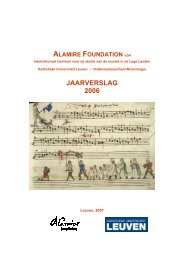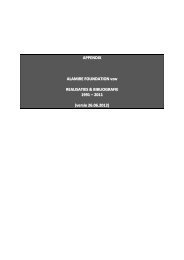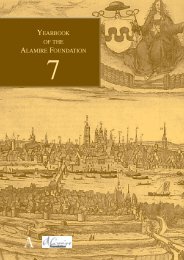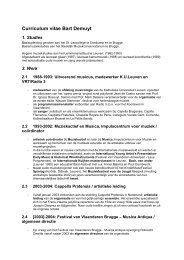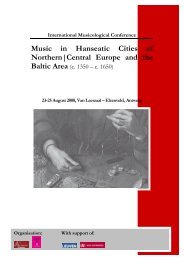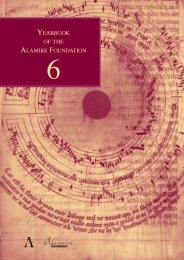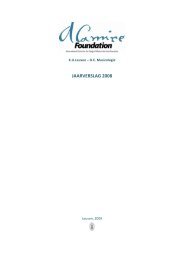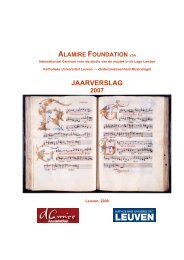Music and Theology in the European Reformations Huis - Alamire ...
Music and Theology in the European Reformations Huis - Alamire ...
Music and Theology in the European Reformations Huis - Alamire ...
Create successful ePaper yourself
Turn your PDF publications into a flip-book with our unique Google optimized e-Paper software.
<strong>Music</strong> <strong>and</strong> <strong>Theology</strong> <strong>in</strong> <strong>the</strong> <strong>European</strong> <strong>Reformations</strong><br />
<strong>Huis</strong> van de Polyfonie (KU Leuven)<br />
19–21 September 2012<br />
Each paper (except for <strong>the</strong> two key-note addresses) runs for thirty<br />
m<strong>in</strong>utes, followed by a ten-m<strong>in</strong>ute discussion. Each session is<br />
separated by a refreshment break.<br />
Registration (11:00–1:00)<br />
I Open<strong>in</strong>g (1:00–1.15)<br />
Wednesday 19 September<br />
Peter de Mey (KU Leuven) <strong>and</strong> Grantley McDonald (KU Leuven)<br />
II (1:15–2:15): Keynote lecture<br />
Andrew Pettegree (University of St Andrews): Current issues <strong>in</strong><br />
<strong>the</strong> historiography of <strong>the</strong> <strong>European</strong> <strong>Reformations</strong><br />
III (2:30–3:50): Developments <strong>in</strong> Biblical exegesis <strong>in</strong> <strong>the</strong> sixteenth<br />
century <strong>and</strong> <strong>the</strong>ir musical outcomes<br />
Maarten Wisse (Vrije Universiteit Amsterdam): Chang<strong>in</strong>g<br />
<strong>in</strong>terpretations of <strong>the</strong> Johann<strong>in</strong>e prologue <strong>and</strong> <strong>the</strong>ir expression <strong>in</strong><br />
renaissance polyphony<br />
Inga Groote (Universität Zurich): <strong>Music</strong> <strong>in</strong> David Chytraeus’ In<br />
Deuteronomium Mosis enarratio (1575)<br />
IIII (4.10–6.10): Lu<strong>the</strong>r, Melanchthon, Bucer<br />
Miikka Anttila (University of Hels<strong>in</strong>ki): “Geistliche, liebliche Lieder”<br />
– <strong>in</strong> search for aes<strong>the</strong>tic criteria of music <strong>in</strong> Lu<strong>the</strong>r’s <strong>the</strong>ology<br />
Mattias Lundberg (Uppsala Universitet): “Vos ad se pueri”:<br />
Exegesis, learn<strong>in</strong>g <strong>and</strong> piety <strong>in</strong> Lu<strong>the</strong>ran school songs 1521–c.<br />
1650<br />
Daniel Trocmé-Latter (University of Cambridge): <strong>Music</strong>, heretics,<br />
<strong>and</strong> reformers<br />
V (6:30–7:30): Keynote lecture<br />
Rob<strong>in</strong> Leaver (Yale University): Melanchthon’s contribution to<br />
Lu<strong>the</strong>ran hymnody
8:00 D<strong>in</strong>ner<br />
Thursday 20 September<br />
VI (9:00–10:10) The musical impact of <strong>the</strong> Lu<strong>the</strong>ran Reformation I<br />
Risto Saar<strong>in</strong>en (University of Hels<strong>in</strong>ki): Emotions <strong>and</strong> music <strong>in</strong><br />
<strong>the</strong> Lu<strong>the</strong>ran Reformation<br />
Thomas Schmidt (University of Manchester): In search of a<br />
“Lu<strong>the</strong>ran” style of motet composition <strong>in</strong> mid sixteenth-century<br />
Germany<br />
VII (10:30–12:30) The musical impact of <strong>the</strong> Calv<strong>in</strong>ist Reformation<br />
Hyun-Ah Kim (Centre for Reformation <strong>and</strong> Renaissance Studies,<br />
University of Toronto): S<strong>in</strong>g<strong>in</strong>g, prayer, <strong>and</strong> sacrifice: <strong>the</strong> neo-<br />
Platonic revival of musica humana <strong>in</strong> <strong>the</strong> Calv<strong>in</strong>ist Reformation<br />
Beat Föllmi (Faculty of Protestant <strong>Theology</strong>, Université<br />
Strasbourg): The Strasbourg Psalter (1537/38): a “miss<strong>in</strong>g l<strong>in</strong>k”<br />
of <strong>European</strong> hymnology?<br />
Frank Dobb<strong>in</strong>s (University of Montreal/Goldsmiths College,<br />
University of London): Clément Janequ<strong>in</strong>’s psalms <strong>and</strong> chansons<br />
spirituels<br />
12:30–1:30 Lunch<br />
VIII (1:30–2:50) The musical impact of <strong>the</strong> Lu<strong>the</strong>ran Reformation II: <strong>the</strong><br />
case of Leonhard Pam<strong>in</strong>ger<br />
Grantley McDonald (KU Leuven): <strong>Music</strong>ians <strong>and</strong> confessional<br />
division <strong>in</strong> sixteenth-century Bavaria<br />
David Burn (KU Leuven): Leonhard Pam<strong>in</strong>ger as a composer of<br />
liturgical music<br />
IX (3:05–4:25) The musical impact of <strong>the</strong> Catholic Reformation I<br />
Michael Questier (Queen Mary, University of London): The<br />
political culture of <strong>the</strong> post-Reformation English Catholic<br />
household<br />
Gioia Filocamo (Università di Bologna): “Canti figurati che<br />
sogliono relassare il spirito et la vera osservanza”: <strong>Music</strong> <strong>in</strong><br />
Italian nunneries after <strong>the</strong> Council of Trent
X (4:40–6:40) <strong>Music</strong> <strong>and</strong> early Christian literature <strong>in</strong> <strong>the</strong> sixteenth<br />
century: <strong>the</strong> Sibyll<strong>in</strong>e oracles, <strong>the</strong> Ancient <strong>Theology</strong> <strong>and</strong> <strong>the</strong> revival of<br />
ancient music<br />
Henk Jan de Jonge (Universiteit Leiden): Sibyls <strong>and</strong> <strong>the</strong>ir<br />
oracles <strong>in</strong> Christian literature from Hermas to Orl<strong>and</strong>o di Lasso<br />
Marjorie Roth (Nazareth College, Rochester): Sibyll<strong>in</strong>e prophecy<br />
as sound<strong>in</strong>g salvation: new light on Orl<strong>and</strong>o di Lasso’s<br />
Prophetiae Sibyllarum<br />
Marie-Alexis Col<strong>in</strong> (Université libre de Bruxelles): The sibyll<strong>in</strong>e<br />
prophecies <strong>in</strong> French music of <strong>the</strong> sixteenth century<br />
7:00–8.15 D<strong>in</strong>ner<br />
XI 8.30–9:00: Katelijne Schiltz (Ludwig-Maximilians-Universität Munich):<br />
Preconcert talk<br />
9:00 Concert<br />
Friday 21 September<br />
XII (9.00–11:00) <strong>Music</strong> <strong>in</strong> Reformation <strong>and</strong> Counterreformation Engl<strong>and</strong><br />
Peter Malisse (KU Leuven): <strong>Music</strong> <strong>and</strong> <strong>the</strong> Henrician<br />
Reformation: bl<strong>in</strong>d spot or last<strong>in</strong>g trace?<br />
Andrew Cichy (Merton College, Oxford): Out of place? The<br />
functions of music <strong>in</strong> English sem<strong>in</strong>aries dur<strong>in</strong>g <strong>the</strong> late<br />
sixteenth <strong>and</strong> early seventeenth centuries<br />
Emilie Murphy (University of York): ‘Imperfect proxy <strong>and</strong> deputy’:<br />
<strong>Music</strong> <strong>and</strong> <strong>the</strong> adaptation of post-Reformation English Catholic<br />
piety, c. 1575–c. 1640<br />
XIII (11:20–12:40): <strong>Music</strong>, liturgy <strong>and</strong> ritual <strong>in</strong> <strong>the</strong> <strong>European</strong><br />
<strong>Reformations</strong><br />
Nils Holger Petersen (University of Copenhagen): Cont<strong>in</strong>uity <strong>and</strong><br />
change: <strong>the</strong> official Danish Lu<strong>the</strong>ran Gradual of Niels Jesperssøn<br />
(1573)<br />
Sarah Davies (New York University): Kirchen Cron or<br />
Baalsfeldzeichen? The organ as a sign of confessional identity,<br />
1560–1660
12:40–2:00 Lunch<br />
XIV (2:00–3.20) <strong>Music</strong>al Contacts <strong>and</strong> Interconfessional Tensions<br />
Alanna V. Ropchock (Case Western Reserve University): “Das<br />
ist e<strong>in</strong>e harte Rede; wer kann sie hören?”: <strong>the</strong> Lu<strong>the</strong>ran copies<br />
of Josqu<strong>in</strong>’s Missa Pange l<strong>in</strong>gua<br />
Stephanie Beghe<strong>in</strong> (Universiteit Antwerpen): Church music <strong>and</strong><br />
Counter Reformation <strong>in</strong> Antwerp, c. 1570–1750<br />
XIV (3:40–5:00) The musical impact of <strong>the</strong> Catholic Reformation II<br />
Xavier Bisaro (CESR, Tours): New s<strong>in</strong>s for new sounds? A<br />
casuistic po<strong>in</strong>t of view on French renaissance music<br />
Elisabeth Giselbrecht (University of Cambridge): One size fits<br />
all? Nikolaus Ste<strong>in</strong>’s publications of Italian music <strong>in</strong> bi-<br />
confessional Frankfurt<br />
XV (5:00–5:30) Clos<strong>in</strong>g<br />
Jos Verheyden (KU Leuven) <strong>and</strong> David Burn (KU Leuven)



